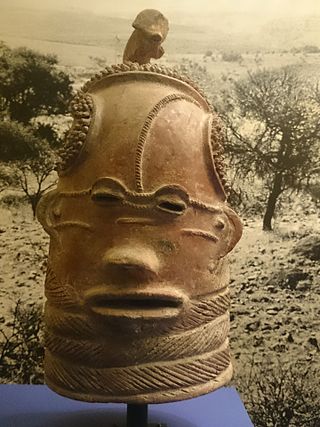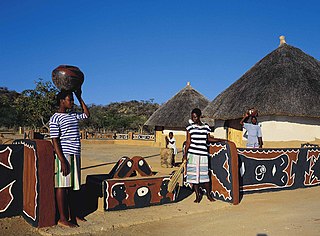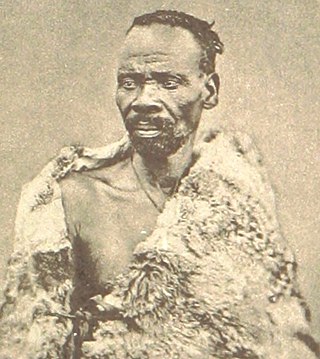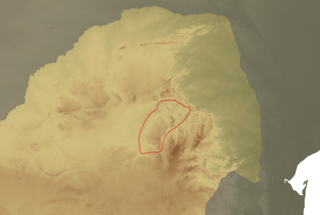
The South African Republic, also known as the Transvaal Republic, was an independent Boer republic in Southern Africa which existed from 1852 to 1902, when it was annexed into the British Empire as a result of the Second Boer War.

Andries Hendrik Potgieter, known as Hendrik Potgieter was a Voortrekker leader and the last known Champion of the Potgieter family. He served as the first head of state of Potchefstroom from 1840 and 1845 and also as the first head of state of Zoutpansberg from 1845 to 1852.

South African Bantu-speaking peoples represent the majority ethno-racial group of South Africans. Occasionally grouped as Bantu, the term itself is derived from the English word "people", common to many of the Bantu languages. The Oxford Dictionary of South African English describes "Bantu", when used in a contemporary usage or racial context as "obsolescent and offensive", because of its strong association with the "white minority rule" with their Apartheid system. However, Bantu is used without pejorative connotations in other parts of Africa and is still used in South Africa as the group term for the language family.
Mbandzeni was the King of Swaziland from 1872 until 1889. Ingwenyama Mbandzeni was the son of Mswati II and Nandzi Nkambule. His mother the wife of King Mswati had died when he was still very young.
The Berlin Missionary Society (BMS) or Society for the Advancement of evangelistic Missions amongst the Heathen was a German Protestant (Lutheran) Christian missionary society that was constituted on 29 February 1824 by a group of pious laymen from the Prussian nobility.

The Pedi or Bapedi, also known as the Sotho, Basotho, Northern Sotho, Basotho ba Lebowa, Transvaal Sotho, Marota, or Bamaroteng are a Sotho-Tswana ethnic group native to South Africa and Botswana that speak Pedi or Sepedi, which is one of the 12 official languages in South Africa. They are primarily situated in Limpopo, Gauteng and northern Mpumalanga.

Sekhukhune I was the paramount King of the Marota, more commonly known as the Bapedi, from 21 September 1861 until his assassination on 13 August 1882 by his rival and half-brother, Mampuru II. As the Pedi paramount leader he was faced with political challenges from Voortrekkers, the independent South African Republic, the British Empire, and considerable social change caused by Christian missionaries.

The South African Wars, including but also known as the Confederation Wars, were a series of wars that occurred in the southern portion of the African continent between 1879 and 1915. Ethnic, political, and social tensions between European colonial powers and indigenous Africans led to increasing hostilities, culminating in a series of wars and revolts, which had lasting repercussions on the entire region. A key factor behind the growth of these tensions was the pursuit of commerce and resources, both by countries and individuals, especially following the discoveries of diamonds in the region in 1867 and gold in 1862.
Mapoch's Caves is a provincial heritage site in Middelburg in the Mpumalanga province of South Africa.

Alexander Merensky was a German missionary, working in South Africa (Transvaal) since 1859.

AmaNdebele are an ethnic group native to South Africa who speak isiNdebele. They mainly inhabit the provinces of Mpumalanga, Gauteng and Limpopo, all of which are in the northeast of the country. In academia this ethnic group is referred to as the Southern Ndebele to differentiate it from their relatives the Northern Ndebele people of Limpopo and Northwest.

The South Africa Medal (1880), often referred to as the Zulu War Medal, is a campaign medal instituted in 1880 and awarded by the British Government to members of the British Army, Royal Naval Brigade and Colonial Volunteers who were involved in a series of South African tribal wars in the Cape of Good Hope, Colony of Natal and Transvaal between 1877 and 1879, most notably for the Anglo-Zulu War of 1879.

Sekhukhuneland or Sekukuniland is a natural region in north-east South Africa, located in the historical Transvaal zone, former Transvaal Province, also known as Bopedi. The region is named after the 19th-century King, Sekhukhune I.
Johannes Dinkwanyane was a member of the Pedi royal family, who was a leading early convert to Christianity. He was the half-brother of the Pedi king Sekhukhune.
BAPO 2 is an ethnic village in the North West province of South Africa.
Mampuru II was a king of the Pedi people in southern Africa. Mampuru was a son of the elder brother of Sekwati and claimed he had been designated as his successor.
Sekwati was a 19th-century paramount King of the Maroteng, more commonly known as the Bapedi people. His reign focused on rebuilding the Marota Kingdom at the conclusion of the Mfecane and maintaining peaceful relations with the Boer Voortrekkers and neighboring chiefdoms in the north-eastern Transvaal. He was the father of rivals Sekhukhune I who took over the Marota/Pedi paramountcy by force, and Mampuru II, his rightful successor.
Kgošikgolo Thulare III, also known as King Victor Thulare III was the king of the BaPedi people in South Africa. He was best known as being an economic freedom fighter for land and justice. He died on 6 January 2021, from COVID-19 complications during the COVID-19 pandemic in South Africa. He was 40 years of age. King Thulare III's funeral was held on 17 January 2021 in Mohlaletsi, Limpopo, South Africa. He received a Special Official Category 1 funeral. The eulogy was delivered by President Cyril Ramaphosa of South Africa.

Christiaan "Chrisjan" Ernst Fourie was an Anglo-Boer War commander of the Middelburg and Johannesburg Commandos and later a combat general for the South African Republic. He should not be confused with his colleagues, the Boer generals Joachim Christoffel Fourie (1845-1900) and Petrus "Piet" Johannes Fourie (1842-1916).

Johannes August Winter was a German Lutheran missionary for the Berlin Missionary Society (BMS) who played an important role in the formation of the Lutheran Bapedi Church in South Africa at the turn of the 19th century, against a backdrop of competing political and economic power struggles between British, Afrikaner and native tribal interests.











